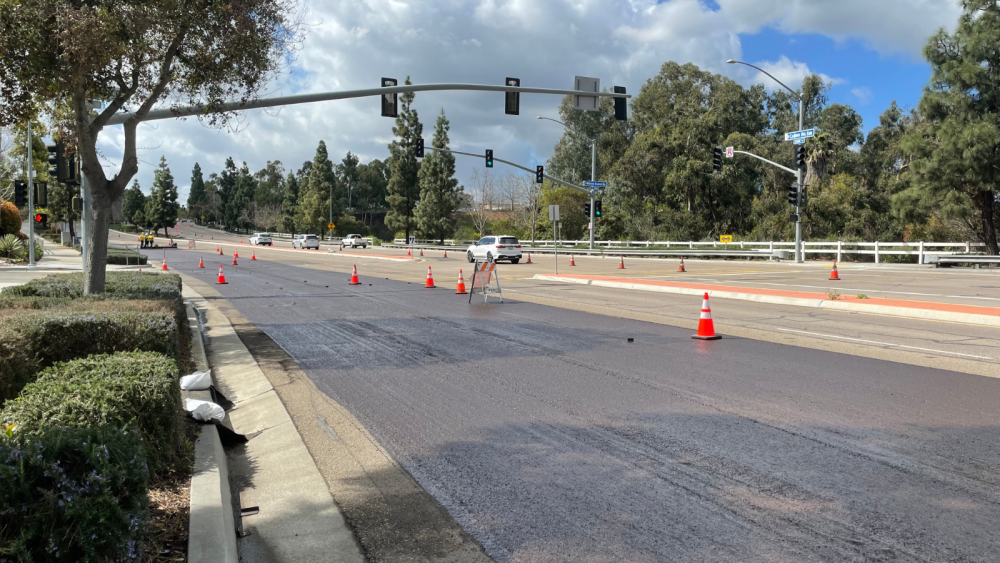Road Repair Projects Begin in Clairemont Mesa, Rancho Peñasquitos, Ocean Beach and Peninsula
March 25, 2024 | City News Team

Several City of San Diego communities will receive improved and safer streets as two slurry seal projects begin this week, part of an overall effort to repair and resurface roads citywide. Starting today, the City will begin resurfacing streets in and around Clairemont Mesa, Rancho Peñasquitos, Ocean Beach and the Peninsula neighborhood of Point Loma.
Slurry seal is used to prevent the deterioration of streets, which is vital to improving the overall condition of San Diego’s network of roads. It reduces the need for a more costly asphalt overlay and reconstruction for badly deteriorated streets. Information about different types of street repair can be found on the Transportation webpage.
Slurry seal is often completed in phases over several days or weeks. Multiple slurry seal projects are happening across the City simultaneously and are often coupled with other upgrades to increase safety and mobility for all modes of transportation.
The latest work as part of Slurry Seal Projects 2325 and 2326 will be completed, weather permitting, through the months of March and April. The following roads will be resurfaced:
- Archer Street
- Fortuna Avenue
- Jewell Street
- Dawes Street
- Lamont Street
- Hiawatha Court
- Hiawatha Way
- Joplin Avenue
- Mabon Place
- Kamloop Avenue
- Jappa Avenue
- Galveston Street
- Littlefield Street
- Voltaire Street
- Udall Street
- Narragansett Avenue
- Guizot Street
- Orma Drive
- Temple Street
- Conde Street
- Conde Place
- Pine Street
- Ampudia Street
- Presidio Drive
- Arista Street
- Whitman Street
- Hortensia Street
- Arista Court
- Fort Stockton Drive
- Arista Drive
- Trias Street
- Crescent Drive
- Nashville Street
- Bervy Street
- Tonopah Avenue
- Frankfort Street
- Asher Street
- Lieta Street
- Camino Del Sur
- Butano Court
- Butano Way
- Sparren Way
- Camino Del Suelo
- Silver Ivy Lane
- Fallhaven Road
- Torrey Bella Court
- Torrey Glenn Road
- Watson Ranch Road
- Galway Place
- Waterford Lane
- Adobe Bluffs Drive
- Crimson Cedar
- Golden Elm Lane
- Gainsborough Avenue
- Clatsop Lane
- Clatsop Way
- Camino Del Suelo
- Gunnison Court
- Pipestone Way
- Alpine Ridge Road
- Orange Haven Place
- Hampe Court
- Rotherham Avenue
- Cayucos Court
- Cayucos Way
- Sparren Way
- Bodie Court
- Calle Tragar
- Bryn Glen Way
- Bryn Glen Court
- Crimson Cedar
- Golden Elm Lane
- Gunnison Court
- Cherry Hill Drive
Slurry seal is a cost-effective pavement preservation method consisting of asphalt emulsion, sand and rock. This mixture is applied to the street surface at an average thickness of a quarter inch and extends the life of already in-good-condition streets.
Streets are selected for resurfacing through a pavement management system that helps determine when to schedule streets. Each street segment is assigned a Pavement Condition Index (PCI) score based on the pavement’s roughness and cracks. Earlier this year, the City’s Transportation Department announced the results of a comprehensive survey of pavement conditions in San Diego where all streets across the City were scored according to the Pavement Condition Index.
To prioritize street paving, the recent PCI scores are used in conjunction with other factors, such as traffic volume, road type, equity, climate resiliency, mobility, maintenance history, other construction projects, and available funding. Repairs are often grouped within a neighborhood to include streets in similar conditions or performed after other projects, such as pipeline replacement.
View a map of past, current and future street repair in your neighborhood by visiting the City’s interactive StreetsSD map.
Filter by Category
Airports (1)
Arts and Culture (9)
Business (20)
City Planning (1)
Environment (46)
Human Interest (7)
Library (14)
Parks and Recreation (21)
Personnel (11)
Public Safety (20)
Public Works (58)
Streets (1)
Technology (4)
Transportation (1)
Airports (1)
Arts and Culture (9)
Business (20)
City Planning (1)
Environment (46)
Human Interest (7)
Library (14)
Parks and Recreation (21)
Personnel (11)
Public Safety (20)
Public Works (58)
Streets (1)
Technology (4)
Transportation (1)
